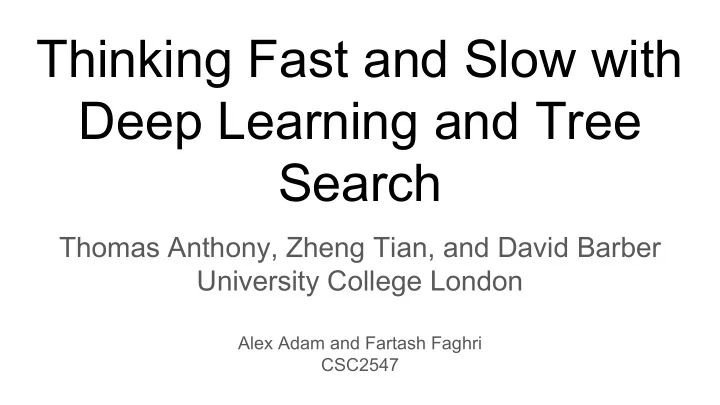

Thinking Fast and Slow with Deep Learning and Tree Search Thomas Anthony, Zheng Tian, and David Barber University College London Alex Adam and Fartash Faghri CSC2547
Hex
What is MCTS ● Tree search algo that addresses limitations of Alpha-Beta Search ● Alpha-Beta worst case explores O(B^D) nodes ● MCTS approximates Alpha-Beta by exploring promising actions and using simulations 1. Select nodes according to 2. At leaf node a. If node has not been explored, simulate until end of game b. If node has been explored, add child states to tree, then simulate from random child state 3. Update UCT values of nodes along path from leaf to root
MCTS in Action
Why not REINFORCE? Maximize the expected reward: Gradient estimator: Find policy that maximizes the expected reward.
Why not REINFORCE? Challenges: ● We can only use differentiable policies (Hence use MCTS!) ● High variance of REINFORCE ● Need to compute efficiently ○ Solution 1: Do roll-outs to compute exactly (with a bit of MCTS) ○ Solution 2: Approximate r(s, a) with a neural network called Value Network
Imitation Learning ● Consists of an expert and an apprentice ● Apprentice tries to mimic expert Expert Apprentice
Imitation Learning Limits ● The apprentice will never exceed performance of expert ● Nothing can beat tree search given infinite resources and time ● In many domains, like game playing, expert might not be good enough Eat Sleep Fail Repeat
ExIt Pseudocode
The Minimal Policy Improvement Technique MCTS as a policy improvement operator Define the goal of learning as finding policy p* s.t. Gradient descent to solve this: Instead of minimizing the norm of minimize:
Learning Targets ● Chosen-action Targets (CAT) loss: Where is the move selected by MCTS. ● Tree-Policy Targets (TPT) loss: Where n(s, a) is the number of times an edge has been traversed.
Expert Improvement Upper confidence bounds for trees: Bias MCTS tree policy:
Value Network and AlphaGo Zero Value Networks can do better than random rollouts if trained with enough data AlphaGo Zero is very similar with a slight difference in the loss function
Results: ExIt vs REINFORCE
Results: Value and Policy ExIt vs MoHEX
References ● Anthony, Thomas, Zheng Tian, and David Barber. "Thinking fast and slow with deep learning and tree search." Advances in Neural Information Processing Systems. 2017. ● Silver, David, et al. "Mastering the game of go without human knowledge." Nature 550.7676 (2017): 354. ● http://www.inference.vc/alphago-zero-policy-improvement-and-vector-fields/ ● Farquhar, Gregory, et al. "TreeQN and ATreeC: Differentiable Tree Planning for Deep Reinforcement Learning." arXiv preprint arXiv:1710.11417 (2017).
Recommend
More recommend